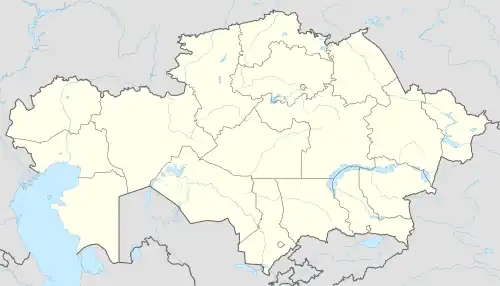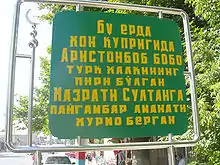| Arystan Bab Mausoleum | |
|---|---|
 The mausoleum in 2015 | |
| Religion | |
| Affiliation | Islam |
| Location | |
| Location | Kazakhstan |
 Shown within Kazakhstan | |
| Geographic coordinates | 42°51′04″N 68°16′05″E / 42.851°N 68.268°E |
| Architecture | |
| Type | Mausoleum |
| Groundbreaking | 14th century |
| Completed | 1909 |
| Specifications | |
| Length | 13 m[1] |
| Width | 30 m[1] |
| Dome(s) | 2 |
| Minaret(s) | 2 |
| Materials | Burnt brick with alabaster mortar[2] |
Arystan Bab Mausoleum (Kazakh: Арыстан Баб мазары) is a mausoleum in Kazakhstan close to the village of Kogam and Otrartobe.
History
A legend states that Emir Timur ordered the construction of a mosque on the site of Ahmet Yesevi's grave but all attempts were unsuccessful. Timur was then told in a dream that in order to have success, he should first build a mausoleum over the grave of religious mystic, Arystan Baba.[1]
The mausoleum dates back to the 14th century and is constructed over Arystan Bab's 12th-century grave, but was reconstructed several times up to the 18th century.[2] In the 18th century the previous mausoleum, which had been destroyed by an earthquake was replaced with a double domed structure supported by two carved wooden columns.[1] Most of the current structure was constructed in the first decade of the 20th century with only the carved wooden pillars, remaining from the original building.[2][3][4]
Description

The mausoleum features a large central arch and wide front facade with minarets at the ends and two large domes to the left of the main arch. As well as the two-chambered table-tomb (gurkhana) of Arystan Bab and three of his students, Hermet-Azyra, Karga-Baba and Lashyn-Baba, a mosque and auxiliary quarters and museum are located in the other rooms of the mausoleum.[2][3] The effect of high groundwater levels led to the mosque being demolished and rebuilt in 1971.[4] A quran showing medieval calligraphy is displayed under glass here.[1]
The mausoleum is today a place of pilgrimage.[4]
Arystan Bab

According to legends, Arystan Bab, a religious mystic, was the recipient of Mohammad's amanat beads or persimmon pip. When he was in Sayram, he passed these on to the eleven-year-old Khoja Ahmed Yasawi, who then became his pupil.[5] The people treat Arystan Bab as a Saint (Aulie). So every Thursday, pilgrims spend the night at his grave and say prayers. A popular expression is widely spread: "spend the night at Arystan Bab, ask Khoja Ahmed".[6] According to legends, Arystan Bab lived for over 400 years.[3][4]
References
- 1 2 3 4 5 KAZAKHSTAN THE LAND OF WONDERS. Almaty: BW-KZ. 2009.
- 1 2 3 4 "ARYSTAN BABA MAUSOLEUM". inform.kz. 2010-01-22. Retrieved 10 May 2011.
- 1 2 3 Paul Brummell (2008). Bradt Kazakhstan - Google Books. ISBN 9781841622347. Retrieved 10 May 2011.
- 1 2 3 4 "Arystan-Bab Mausoleum / Attractions / Портал visitkazakhstan.nur.kz". visitkazakhstan.nur.kz. 2011. Archived from the original on 1 September 2011. Retrieved 10 May 2011.
- ↑ "SADMOL travel company". sadmol.com. 2011. Archived from the original on 15 April 2012. Retrieved 10 May 2011.
- ↑ "«Тарих» - История Казахстана - школьникам | Исторические вехи | Средневековый Казахстан (VII – XVIII в.в.) | Исторические личности | Арыстан Баб".